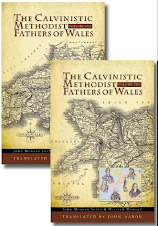Brief lives: John Elias
Biography
Biography
First, let's see the 28-year-old John Elias fighting one of his greatest battles. It is the Battle of Rhuddlan.
It is the late summer of 1802. Unlike South Wales, North Wales is still largely a mission field, and Rhuddlan is playing host to a fair on a Sunday. There are men and women dancing, drinking and revelling. Musicians and singers are everywhere. People have come to Rhuddlan from miles around in the hope of being hired to work in the harvest fields.
The noise is deafening. It is one vast open-air party. Elias had asked a few Christian friends from Denbigh and St. Aseph to meet him at Rhuddlan that Sunday.
On arrival, he stood on the top step of Mrs. Hughes's pub, 'The New Inn'. He and the little group then sang a setting of Psalm 24. Elias read from the Bible. Then he prayed, and as he prayed, tears fell freely down his cheeks.
The din from the fair had lessened by the time another hymn was sung and a group of onlookers started to gather.
Then he announced the text of his sermon, Exodus 34.21: 'Six days thou shalt work, but on the seventh day thou shalt rest; even during the ploughing season and in harvest thou shalt rest.'
Robbing God
During the long, solid exposition of its meaning, the crowd became larger and larger. At the climax of his message, Elias cried out: 'Oh, you robbers, you robbers. You are robbing the Lord. You are robbing my God of his day.' (He had a habit of poking his finger.) People started to shake and didn't know why they were shaking. One man said people looked panic-stricken.
In tears, Elias explained the gospel, offering Christ freely to all who would repent and believe. Another observer said that the effect was like a strong wind flowing across a field of corn - with the crowd being the field of corn.
That one sermon was used by God to sweep hundreds into his kingdom. It also put an end forever to those hiring fairs in Rhuddlan.
In our day, professional actors have said they could produce the same effect as Elias's message. Tudor Jones says of that: 'What a lot of nonsense.' The people converted that day served the Lord for the rest of their lives.
How did he do that?
Elias was no actor and he did not offer churchianity or philosophy. He preached Christ crucified and risen, and God gave the victory.
Now we are not used to such an extensive impact from one open-air message, but John Elias witnessed such scenes regularly throughout his 47-year itinerant ministry.
Elias was born in Abererch in 1774, not all that far from where Butlins is today. He was raised in poverty and taught to be a weaver. His parents were not interested in Christianity, but he was won to Christ through the witness of his grandfather. Those of you who are grandparents take note of that point. When he was 19, he was received into membership of the Calvinistic Methodists, later to be known as the Presbyterian Church of Wales. When he was 20, he was ordained as a Calvinistic Methodist minister. His name until that moment was John Jones. But the fiery army he had joined was full of 'John Joneses', so a wise old elder suggested using a Welsh custom of taking your father's Christian name as a surname. His father was Elias Jones so from then on he became 'John Elias'.
Into the wilderness
In 1799, the 25-year-old minister was asked to leave Caernarvonshire and minister in Anglesey. The Christians of the time looked on Anglesey as a real spiritual wilderness. Certainly the people plundered the wreckage of shattered ships and the illegitimacy rate was high. Elias preached with tremendous fire and was successful far beyond his own expectations. To his surprise, people flocked to hear him. Soon there were visible signs of his ministry. Windmills stopped turning on Sundays. People returned goods pillaged from wrecked ships. And new churches were started. To be accurate, 44 Calvinistic Methodist churches were planted in Anglesey during his ministry. And some of them had very large buildings.
In 1820, he preached at a typical field meeting in Anglesey. By counting two sides of the crowd, one man thought there were 10,000 present; another tried the same thing and worked out 12,000. In 1820, 10,000 was a quarter of the population of Anglesey. Either way, Elias held the crowd. He could certainly be heard a mile away from the platform. He could rivet attention. Hearers lost thoughts of space and time.
Many went pale with fear or had overwhelmingly intense feelings. The only way to explain John Elias is by the power of God.
Did he look special? No; he was 5 foot 10 inches and slim for his height.
Did he believe something unusual? No; he was a five-point Calvinist, so don't tell me Calvinists can't be evangelistic.
His private life was pure. His wife had four children, but only two lived. The girl, by the way, was called Phoebe. He wrote these words about the two who only lived a few hours: 'I am persuaded that they were allowed to flee from the afflictions of this life to everlasting happiness, through the sovereign grace of God, being purified through the blood of the Cross' (page 57 of the Banner book).
Elias was self-educated. You can read his sermons today, as with Whitefield, and wonder how such words shook people to their very foundations. One convert from Holyhead was Dr. Owen Thomas, who ministered in Liverpool among the Welsh Calvinistic Methodists for 26 years until 1891.
Elias was often in Liverpool. The church in Pall Mall had four services in one day, all packed out when he was present. In later life, he was often ill, finally dying from gangrene in 1841. He was 67.
D.J. Stephens






No comments:
Post a Comment